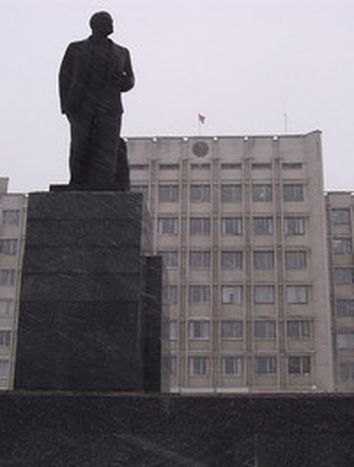
Olga Karatch: 'Lukashenko takes EU leaders for great lumps'
Published on
Translation by:
 claire hooper
claire hooper
The German presidency of the EU judged the local elections on January 14 in Belarus ‘undemocratic’. The country’s opposition has already announced its intention of contesting Lukashenko
Olga Karatch is a primary school teacher and one of the most active Belarusian dissidents. As leader of the association ‘Our House’ ('Nasz dom’] and editor of a clandestine opposition magazine, she fights non-stop to get her country to respect human rights. Passing through Warsaw, back and forth between Prague and Brussels, Karatch tries to heighten the EU authorities’ awareness regarding the matter of freedom of the press in Belarus. Today, she lives near the Russian and Latvian border in Vitebsk, where she works as a town councillor.
The right to be informed
Karatch is young, confident and full of energy and she has been imprisoned on several occasions. She tells me about her NGO: 'We are active in ten different places in Belarus, excluding the capital, Minsk. It's not because we lack volunteers or opponents to the regime, but because of the repression.'
Lukashenko became president in 1994. Karatch talks about the schoolchildren of that period. 'They are now 20 years older, and have been indoctrinated to such a point that it is difficult to explain to them that they have lived a lie their whole life.' An analysis by ‘Our House’ revealed that those who support Lukashenko are usually aged between 18 and 22, or are above 65. The opponents of the ‘Master of Minsk’s’ regime in the meanwhile are between 23 and 45 years old.
So how can one make the Belarusians realise what they’re living? According to Karatch, it is important to take it one step at a time. 'In Belarus, everyone falsely believes that the media is free. The majority of us still remember the Soviet period when everything except state television was forbidden. It was a era when people listened to ‘Radio Free Europe’ with shame. Today we have access to television, cable, hundreds of newspapers and the internet. These are mainly entertainment channels which broadcast practically no information programmes. The same goes for the press. In the newsstands there is any number of papers but you can only find celebrity magazines, crosswords or ‘old-lady’ magazines.
What happened to my money?
Alongside the existence of this wall of silence, the EU awards its Sakharov Freedom Award 2006 went to Alexandre Milinkievich, one of the leaders of the democratic opposition.
According to Karatch, 'EU policy is extremely vague. The greatest sponsor of Russia is still the EU which buys its gas, petrol and textiles there without so much as batting an eyelid. European officials want to teach the dictator democracy without questioning him about the disappearances of his opponents or his management of public finance. And Lukashenko makes the most of it,' continues the dissident. 'In his eyes, dialogue is for the weak. He takes the European rulers for great lumps because they give money unconditionally. By building a gas pipeline under the Baltic Sea and declaring that the energy problems of the Ukraine and Belarus are nothing to do with them, the EU is condemning these countries to being at the mercy of – or rather banished by - Russia.'
The only way is up
When she considers the economic side of things, Karatch begins to hope for a solution to the situation. Last January, for the second time less than a year after Georgia, Moscow turned off Belarus’s ‘energy’ tap. 'People have had enough,' says Karatch. 'If they’re paying increasingly more without receiving anything in return, one day they’ll rise up and ask where their money has been going. Then, Lukashenko will not be in a position to justify even the smallest of his expenditures, let alone reply to their question.
So, discontent or revolution ? Olga smiles mysteriously. 'In Belarus, no one has prepared a revolution, other than Lukashenko. It's his greatest mistake. In the Soviet tradition of looking for an enemy, guilty for everyone’s mistakes, he has constantly repeated that it is the opposition who was looking for a revolution. This is to the point that the Belarusians have ended up believing that there is a sizeable opposition and that an uprising was possible. Those who demonstrated have finally discovered the reality/truth. In a 24 hour speech the head of the KGB maintained that those who protest would be punished by a 25 year prison sentence or even by death. And in Belarus, you don’t joke about that.'
Karatch isn’t afraid of protesting loud and clear. 'Your first imprisonment is like your first love – you don’t forget it. After a time it becomes banal. The most important thing in this struggle is not to allow yourself to get caught and to keep your humanity,' she sighs with resignation.
Translated from Olga Karatch, walcząca o człowieczeństwo


